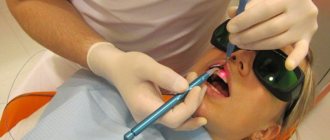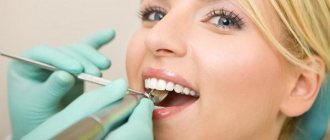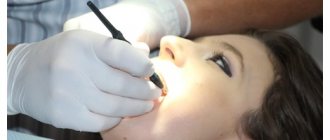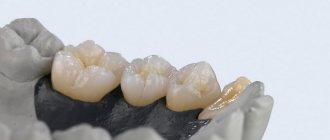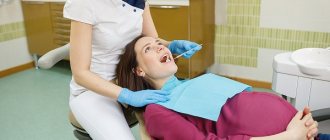Tooth extraction during pregnancy
Pregnant women often complain of dental problems. And at the same time, they are afraid to go to the dentist, since anesthesia can harm the child. In fact, it is not anesthesia that causes the greatest harm, but the reluctance to resort to competent treatment. After all, untreated teeth are a source of infection, which has a detrimental effect on both the mother and the fetus.
A bad tooth provokes pressure surges, which already threatens termination of pregnancy. And taking painkillers during pregnancy leads to congenital defects in the newborn, miscarriages, and stillborn babies.
Is it possible to remove teeth in position?
Since many medications are prohibited during pregnancy, expectant mothers refuse to have their teeth treated or removed and endure pain until childbirth. But in many cases such a measure is not justified. It is possible and necessary to carry out treatment or extirpation, the main thing is to do it correctly.
Anesthesia is done using local drugs that have minimal side effects and do not have a negative effect on the fetus. However, the operation is performed only if there is an urgent need.
Indications for extraction:
- pulpitis, periodontitis, in which neighboring tissues become infected;
- deep carious lesion affecting the root;
- cyst or malignant neoplasms;
- growth of a figure eight, complicated by inflammation or if it presses on an adjacent molar;
- tooth root fracture;
- rapid development of periodontal disease, which is not amenable to therapeutic treatment.
If a pregnant woman experiences pain when chewing, she will not be able to eat properly, which leads to a deficiency of nutrients. This situation negatively affects her body, the formation and growth of the fetus.
The doctor considers each case individually. If possible, reschedule the operation for a more convenient time.
Indications for the procedure
We found out whether teeth are removed during pregnancy and whether it is even possible to carry out such a procedure at this time. Obviously, there needs to be a compelling reason for its appointment. This is a surgical operation, which in the situation under consideration is performed only if there are strict indications:
- infection of surrounding tissues: usually this phenomenon is observed with the rapid development of carious lesions and its complications - pulpitis, periodontitis. That is, when it is not possible to maintain one, and inflammation progresses very quickly,
- severe damage down to the root,
- malignant neoplasms or cysts: in this case, not only removal, but also surgical intervention to remove the tumor may be required,
- unexpected growth of wisdom teeth, which causes damage to its “neighbors” and leads to acute inflammatory processes,
- advanced gum disease: the presence of a serious pathology, which again progresses very quickly, while drug therapy does not produce positive results.
Pulpitis may be an indication for tooth extraction
. Due to painful sensations in the oral cavity, a pregnant woman begins to become very nervous and worried. In addition, this inevitably affects the diet of the expectant mother, which is why the baby involuntarily suffers. Therefore, the issue of dental treatment during pregnancy must be resolved.
How does the timing of tooth extraction affect pregnancy?
In case of severe inflammation and pain, it is not always possible to postpone surgical intervention. If there are indications for extraction of a dental unit, then the possibility of carrying out the procedure must be agreed with the therapist and gynecologist. In this case, the period of bearing the child is important. Each trimester has certain restrictions and possible complications for the mother and fetus.
Possibility of extirpation according to timing:
- First trimester. The placenta is being formed, the organs and systems of the child are being formed, so any medical manipulations are performed with extreme caution and only according to strict indications. During this period, most drugs are contraindicated, and surgery without them is impossible. Medicines, x-rays, and computed tomography have a negative effect on the fetus, causing various abnormalities. Some medications cause miscarriage. Even treatment of deep caries can be postponed to a later date. However, there are situations that do not allow you to avoid removing a diseased tooth. If there is severe pain and inflammation, this leads to hypertonicity of the uterus, nervous breakdowns, spread of infection to other organs, and infection of the fetus. In this case, the dentist can perform the operation despite contraindications.
- Second trimester. After 3 months, the fetus is formed and the placenta is well protected. During this period, many types of treatment are allowed, including extraction, except for complex cases with a figure eight. Mother's stress and medications do not have such a strong effect on the child and pregnancy. Local anesthetics can be used safely. Before a CT scan or X-ray, a woman puts on a special protective apron.
- Third trimester. Surgical intervention is highly undesirable. Although the fetus has become physically stronger, by this time the placenta is thinning and protects it less well. In addition, the period is dangerous for premature birth. Stress and pain can cause uterine contractions. Starting from the thirty-fourth week, almost any treatment is stopped.
At any time, extraction is carried out for purulent inflammation, which cannot be cured by therapeutic methods. In addition, if a pregnant woman suffers severe pain and is constantly under stress, this can have a bad effect on the child’s psyche.
Therapy
| Service | price, rub. |
| Primary consultation and examination with a doctor | For free |
| Initial consultation with an implantologist, orthodontist, orthopedist (orthopantomogram is required) | For free |
| Examination by a doctor with prescription of medication | 500 |
| Help for antenatal clinics, hospitals, sanatoriums | 500 |
| TREATMENT OF CARIES | |
| Treatment of caries “without drilling” ICON technology – 1 tooth | 2500 |
| Treatment of caries (filling, anesthesia, lining) | 2400 — 3800 |
| Treatment of deep caries (filling, anesthesia, x-ray, lining) | 3000 — 4500 |
| Artistic tooth restoration (frontal group of teeth) | 4700 — 6350 |
| Restoration of a chewing tooth (filling, anesthesia, x-ray, pin) | 3000 — 4650 |
| NERVE REMOVAL – CANAL TREATMENT (depulpation) is carried out in two visits, payment in stages | |
| Treatment of pulpitis of a 1-canal tooth, without the cost of a filling | 3700 — 4800 |
| Treatment of pulpitis of a 2-channel tooth, without the cost of a filling | 5700 — 6800 |
| Treatment of pulpitis of a 3-channel tooth, without the cost of a filling | 7700 — 9800 |
| Treatment of pulpitis of a 4-channel tooth, without the cost of a filling | 9700 — 11000 |
| Installing a seal | 2800 — 3200 |
Initial consultation is free.
Wisdom tooth removal during pregnancy: risks and complications
Surgery on the third molar is the most difficult. The procedure itself has a high probability of developing complications, especially in the lower jaw. Extracting the root of a lower extreme molar requires cutting into the gum and removing part of the bone, which is a more traumatic surgical procedure than a simple procedure.
After extirpation of the figure eight, body temperature may rise, severe pain in the jaws, head, neck, throat, swelling of the face and other negative phenomena may occur. The recovery period is long and painful. For these reasons, surgery is performed only in extreme cases: if there is a risk of infection spreading, or if there is severe, ongoing pain.
If it is possible to wait until childbirth or at least until the 2nd trimester, then the extraction of the figure eight is postponed.
Treatment of pulpitis and periodontitis. X-ray during pregnancy.
In the case of such a complication of caries as pulpitis - inflammation of the nerves, it is necessary to carry out appropriate treatment under anesthesia, which we have already mentioned. Regarding the treatment of periodontitis - inflammation of the peri-root dental tissues, here you can safely do without the use of painkillers. But in both cases, you cannot do without an x-ray, which is necessary to fill the root canals of a tooth. Most pregnant women are afraid of X-rays, and many dentists recommend treating such diseases after the birth of the child. But think for yourself, one shot, which is carried out using all precautions, namely the stomach is protected with a so-called lead apron, will not harm the fetus, and will be very useful during the treatment process. Modern radio imaging devices have a tenfold reduced radiation dose, and the quality of the images is no worse than film ones.
Removal of tooth nerve during pregnancy
Depulpation is done for deep caries, when pathogenic microflora has penetrated the root canal and affected the pulp. Treatment requires local anesthesia, so the procedure is not recommended in the 1st trimester.
In order to leave the dental unit alive, they try to cure the nerve. If most of the pulp is affected, it is completely removed. If the nerve is treated with a therapeutic method, then the pregnant woman should regularly visit the dentist, as a relapse of the disease is possible.
Modern clinics do not use arsenic, which is absolutely contraindicated for pregnant women. For treatment, safe drugs with natural ingredients are used.
Teeth cleaning
| Service | price, rub. |
| Initial consultation with a doctor | For free |
| Comprehensive professional hygiene (including ultrasonic removal of dental plaque, Air-flow, polishing, varnish coating) Promotion | 4000 3600 |
| Ultrasound removal of tartar – 1 tooth | 300 |
| Removal of pigment plaque with the “Air-flow” system – 1 tooth | 300 |
| Plaque removal using the Air-flow method – 2 jaws | 3000 |
| Ultrasonic dental plaque removal – 2 jaws | 3000 |
| Preventive fluoridation of teeth with GELATO – 2 jaws | 800 |
| Using the Optra Gate disposable retractor | 350 |
| Teeth whitening Opalescence Boost | 10000 |
| Skyce installation (including the cost of decoration) | 2000 |
All initial consultations are free.
Tooth extraction during pregnancy: anesthesia and medications
Anesthesia is required for surgery. General anesthesia is not acceptable. Anesthesia with lidocaine and similar anesthetics with adrenaline is also not carried out for pregnant women. The drugs can cause cramps, muscle weakness, severe allergic reactions, and lower blood pressure.
Modern painkillers contain a minimum of adrenaline and do not contain vasoconstrictor components that cause uterine hypertonicity. When applied topically, they are practically not absorbed into the blood, therefore they are safe for the fetus.
Among the acceptable medications, the safest ones can be identified:
- Ultracaine;
- Alfacaine;
- Artifrin;
- Primacaine;
- Ubistezin.
During forced surgery, you do not have to endure pain, as happened several decades ago. Today, extraction is done absolutely painlessly.
If gum tissue is cut during surgery, antibiotic therapy is necessary. Pregnant women are usually prescribed Amoxiclav, which has an antibacterial and bactericidal effect. To reduce fever, a minimum dosage of Paracetamol may be prescribed.
Chlorhexidine, Miramistin, Romazulan - safe antiseptics - are used for mouth rinsing.
Means for healing the hole, approved for pregnant women
It is recommended to refrain from eating for about 3 hours. Immediately after treatment, you should not heat the sore spot - this can only intensify postoperative symptoms and even provoke inflammation. Rinsing your mouth is also contraindicated, since this can damage the blood clot, which is a kind of barrier that protects the open wound from infection.
As for medications, pregnant patients are usually prescribed Paracetamol for pain (0.5 g is the maximum single dosage) and the antiseptic Amoxiclav. A chamomile decoction for mouth rinsing will help relieve signs of inflammation and provide additional disinfection. Before using it, be sure to consult a specialist.
Patients are often prescribed Amoxiclav
What to do after tooth extraction during pregnancy
Even if the procedure was successful, without pain, complications may develop during the recovery period. It is very important that after extirpation a blood clot is formed and firmly attached. It protects the resulting cavity with exposed bone and nerve endings from infection by bacteria and food.
The natural “plug” may come off in the following cases:
- sticking to a cotton swab (placed after surgery) if held for too long;
- licking the hole with the tongue;
- using a drinking straw;
- newly opened bleeding.
If the blood clot falls out, a new surgical intervention will be required. Otherwise, an inflammatory process will occur, which can lead to complications.
It is not recommended to get tired on the day of surgery. After the procedure, you need to go home and rest. You can eat after 3 - 4 hours. Food should be at a comfortable temperature, soft or liquid. Spicy, rough foods that injure soft tissues should be excluded. You should not smoke, as nicotine constricts blood vessels and interferes with healing.
You can rinse your mouth on the second day. As an antiseptic, pharmaceutical preparations, decoctions of medicinal plants, and an aqueous solution with salt and soda are used. Medicines will prevent the development of infection and speed up wound healing. Rinsing should be gentle and not intense, otherwise the blood clot will come off.
When brushing teeth, the surgical site is bypassed. You should use a toothbrush with soft bristles.
Until the wound heals, you should not overheat the body or exert physical stress. Otherwise, bleeding may resume.
What is the safest time for removal?
As we have already explained above, in fact, there is no safe period for tooth extraction. Because even if anesthesia can be used in the second trimester, then after this operation you will need to rinse the mouth with antiseptic solutions (not all of them are allowed), and you will need to take certain medications. What if a complication develops? After all, then even stronger therapy will be required! So it’s better to hold off on deleting it. But if the indications are urgent, then any period will not be a limitation, because a bad tooth means pain, stress and, of course, an acute inflammatory process, which is also dangerous for the fetus.
How to prevent tooth extraction during pregnancy
A full examination and treatment by a dentist should be done at the planning stage of conception. But even in this case, there is no guarantee that dental problems will not appear during pregnancy. After registration, a pregnant woman should regularly visit the dentist. If diseases are detected early, they can be treated safely and painlessly.
It is necessary to remember and carefully follow all the doctor’s recommendations for the prevention of diseases of the dental system. After conception, the composition of saliva and hormonal levels change, causing a deficiency of macro- and microelements and vitamins. Gingivitis is often diagnosed, which develops against the background of loose gums and reduced immunity. At this time, it is very important to eat right and maintain good oral hygiene.
In the second trimester, identified problems can be safely eliminated. After professional hygiene at the dentist, dental protection improves significantly, so do not neglect this procedure.
Is it possible to give painkillers to pregnant women?
Dental anesthesia during pregnancy is not contraindicated; on the contrary, it helps reduce pain and stress, which negatively affect the condition of mother and baby.
Modern anesthetics based on articaine are absolutely safe during pregnancy, because:
- The drug is injected exclusively into the area of intended intervention, and its entire volume is distributed there.
- The drug does not enter the bloodstream and deep tissues, so its penetration through the placenta to the baby is impossible.
The newest drugs for pain relief also reduce the content of vasoconstrictor components. The child will not experience any discomfort or lack of nutrients during the mother’s treatment.

